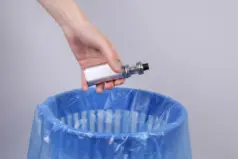
Disposable e-cigs offer clear benefits to some users and have become a substantial part of the UK vape market. But this success has drawn criticism as used products have been publicly discarded or found their way into the standard waste disposal system. Companies have recognised this problem and are acting to adopt more sustainable environmental business practices.
The vape sector in the United Kingdom is reported to have grown by 23.4% between 2017 to 2021, according to a recent report. This represents an increase of £251 million, and now values the UK market at £1.325 billion during 2021.
In no small part, this rise in sales value and volume has been down the success of disposable vapes which attract ex-smokers with their comparatively low entry price point and convenience.
Discussion about vaping’s impact on the environment was front and centre at a recent industry event where concerns were shared, and potential solutions discussed. Discussions that have been mirrored by politicians in the House of Commons.
Conservative MP David Jones recently pressed the Department for Environment, Food and Rural Affairs on the subject of carelessly discarded disposable vapes. The Government stated its current position is not to legislate but to encourage producers in the vaping sector to adopt models of best practise.
Elsewhere in Parliament a full debate took place that considered the environmental impact of disposable vapes. Government ministers emphasised that they are intent on getting companies to register as Waste Electrical and Electronic Equipment recycling (WEEE) producers for the forthcoming compliance year.
Across Europe, it is estimated that 10 tonnes of lithium are lost due to disposables not being recycled every year. This, experts say, is sufficient to power the batteries of 1,200 electric vehicles. But what can be done when it comes to single-use plastics are reclaiming valuable and critical resources such as lithium metal?
Smoore, the world’s largest vape product manufacturer believe it has created a potential solution.
Rather than single-use plastics, the company’s FUTURE product range uses bio-based materials which will break down naturally in the soil. Smoore says this delivers a reduction in plastic use by 60% and carbon emissions by 52-58%.
“Users can separate the internal components of the device, such as the battery core, plastic, and juice tank, and recycle them separately,” a company spokesperson said.
The process replicates Riot Labs’ first to market disposable product with its use of recycled components.
Vaporesso, another leading ecig brand, has launched a special campaign that will run over the Christmas period where it is encouraging users to upload pictures of themselves depositing spent disposable ecigs into Vaporesso Care recycling boxes in stores. Vapers will be able to win ecig products and branded merchandise by taking part in the activity that helps keep toxic substances and non-biodegradable products out of landfill sites.
With these brand leaders forging a path to sustainability, 2023 looks like the year when environmentally friendly products will become commonplace.
